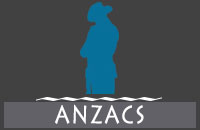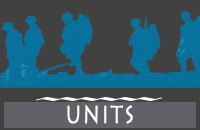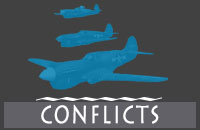The 2/1st Battalion was raised at Victoria Barracks, Sydney, on 16 October 1939 as part of the 16th Brigade of the 6th Australian Division. It relocated to the newly-opened Ingleburn Camp on 2 November and, after conducting basic training there, embarked for overseas service on 10 January 1940.
Disembarking in Egypt on 13 February 1940, the 2/1st moved to Palestine, where it was concentrated with the rest of the 16th Brigade at Julis near Gaza. The brigade trained in Palestine until the end of August, when it moved to Egypt to carry out its final preparations for active service with the 6th Division.
The 2/1st Battalion's first campaign of the Second World War was the advance from Egypt into eastern Libya in January and February 1941. The battalion was involved in the attacks to capture Bardia (3-5 January) and Tobruk (21-22 January), and was left to garrison Tobruk as the advance continued. It left Tobruk on 7 March, ultimately bound for Greece with the rest of the 6th Division.


















